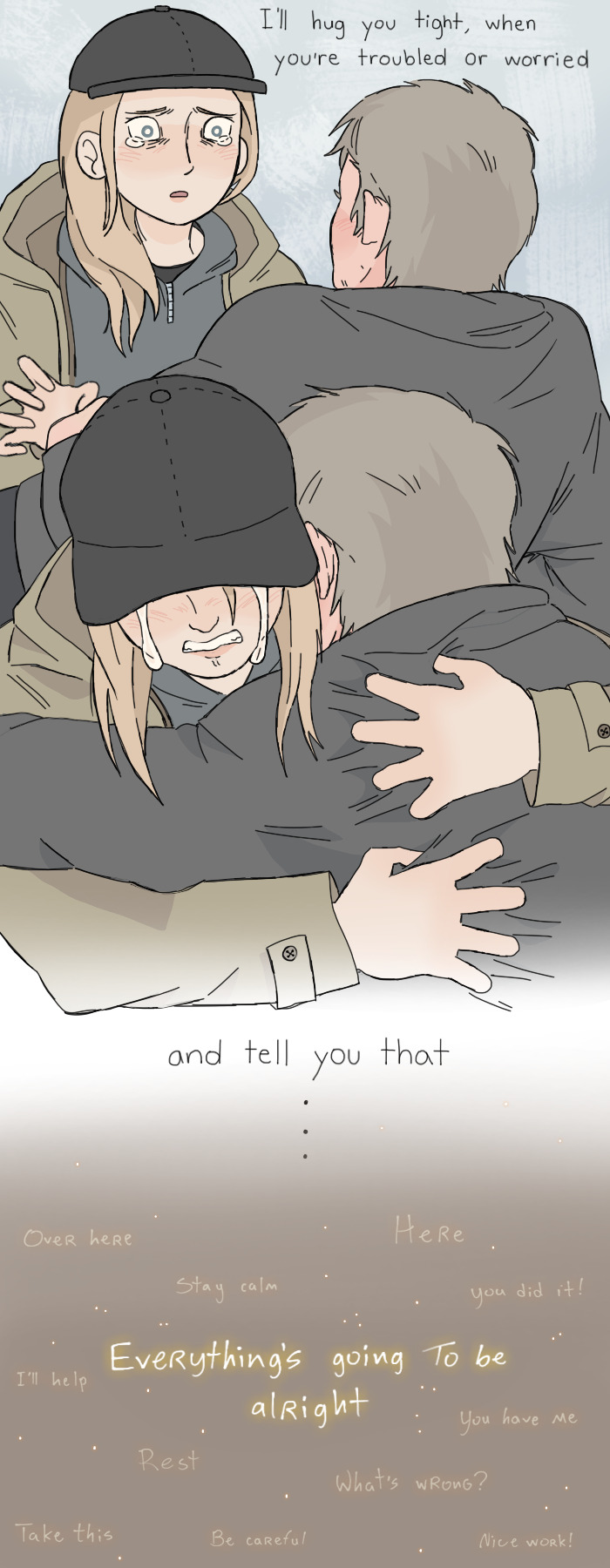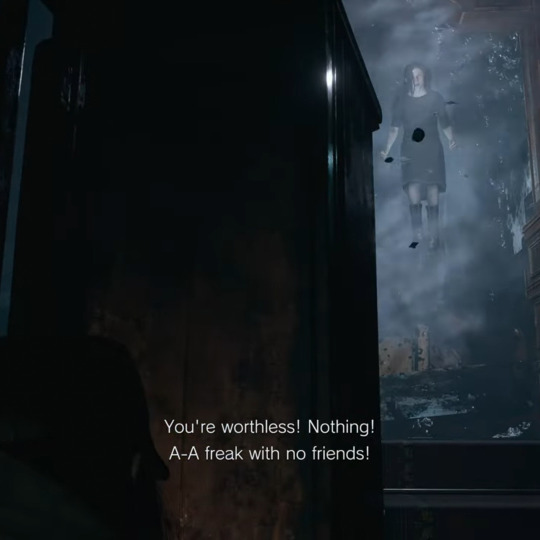Ukraine, 24, she/her, Multifandom person ฅ^•ﻌ•^ฅ
Last active 60 minutes ago
Don't wanna be here? Send us removal request.
Text
Trey Clover: A Psychological Analysis
Disclaimer: Although this post is written by a professional psychologist, it is not intended to serve as a formal diagnosis. Rather, it is a character analysis of Trey Clover, created out of personal interest and passion for world-building. In psychological practice, accurate assessment should never be based solely on external observation.

Trey Clover is portrayed as a calm, conscientious “big brother” figure. He is described on the wiki site as “mild-mannered” and essentially a parental figure for Heartslabyul’s students, often smoothing over conflicts caused by the strict leader Riddle Rosehearts. In personality terms he comes across as laid-back and agreeable. He carries out his vice-dorm-leader duties patiently – for example, a game scene shows him calmly checking on injured RSA students and apologizing for their attackers’ behavior (book 5, chapter 55). Under pressure Trey likes to think things through and have backup plans, which suggests high conscientiousness and composure. He generally avoids drawing attention, downplays achievements, and even hides his face when people make a fuss over him (Deuce’s Wish Upon a Star vignette). Altogether this profile matches a highly introverted, dutiful personality (analysts note he aligns with an ISFJ-type in MBTI: supportive, reliable, community-minded), with high Agreeableness and Conscientiousness in Big Five terms.
Despite this gentle exterior, Trey’s behavior also hints at underlying conflict: If pushed, Trey can flip to a surprisingly harsh side. A canonical example is his “sadistic front” when angry: after being injured, he threatened the whole dorm of Savanaclaw to suffer after he was injured by Ruggie. More generally, the profile notes he often has to “smooth things over” when Riddle “gets out of hand”, implying Trey suppresses frustration to keep the peace. In sum, Trey’s persona is one of a self-effacing caretaker – composed, thoughtful, and conflict-averse – with occasional flashes of hidden anger when his calm facade cracks.
Emotional Expression and Coping Mechanisms
Trey frequently suppresses his own emotions. In dialogue he rarely shows strong upset or excitement; like when peers mock an outfit he hides behind a pillar and quietly admits embarrassment. This indicates he is sensitive to others’ opinions and prone to anxiety about standing out. His low-key smile often masks stress, and he downplays praise. Psychologically, he embodies a “false self” in Winnicott’s sense: a compliant facade created to meet others’ expectations. Trey’s genial niceness is not always “genuine good will” but rather a strategy to keep life calm and conflict-free: As one source notes, he’ll help others mainly to avoid emergencies or because “he knows he’ll get something of equal value in return”. This suggests his amiability functions more as self-protection than pure altruism – a classic sign of a false-self coping style, where the individual’s own needs and spontaneity are subordinated to pleasing others.
When stress does break through, Trey handles it with careful control. He plans and rationalizes, rather than venting impulsively. For instance, during sports and club activities he calmly scouts for problems, and when the dorm’s reputation is at stake he quietly rises to the occasion just to not discredit them. In crises he often mediates or stays level-headed rather than lashing out. This suggests high-functioning anxiety: outwardly composed and dependable, but internally vigilant and anxious about outcomes. Evidence of inner anxiety appears in his backstory and behavior – he seems prone to worry about responsibility and avoids risk-taking. He even exemplifies classic caretaker burnout patterns: always tending to others’ needs while neglecting his own emotional expression.
Family Background and Upbringing
Trey’s childhood set the stage for his caretaker role. His family runs the Clover family bakery, Patisserie Clover, and he spent his youth working there with his younger siblings. As the oldest child, Trey routinely assumed a parental role, even ensuring his little siblings performed tasks like brushing their teeth nightly. These details show he was parentified early on – effectively serving as a co-parent in his own family. Clinically, this kind of parentification imposes heavy psychological costs on a child, as they shoulder adults’ responsibilities. In fact, research on parentified children notes that they often “incur a cost to their own psychic stability and development” when asked to care for others without reciprocity. Trey’s upbringing fits this pattern: he learned from childhood to prioritize others’ welfare (family and friends) above his own, shaping him into a natural caretaker.
This background influenced Trey’s personality. Growing up in a large family bakery likely made him responsible and service-oriented. His mastery of baking may stem from early training. However, constant caretaking may also have stunted his ability to express personal needs. For example, a childhood incident underscores this: when Trey and Che’nya got Riddle into trouble, Trey's family was heavily scolded for his irresponsibility. The canon notes this event was “extremely formative”, causing Trey lasting anxiety about responsibility. Thus from an early age, Trey learned to be cautious and to shoulder blame quietly. His emotional development was framed by these expectations – putting others first and avoiding conflict – contributing to his current habit of emotional suppression and self-restraint.
Interpersonal Dynamics
Trey’s relationship with Riddle is particularly telling. He supports Riddle’s strict rule-following but is more lenient and pragmatic. Officially, he “always backs up the overly-strict Riddle”, yet he tempers Riddle’s actions to preserve harmony. At the same time, Riddle’s authoritarian style likely reinforces Trey’s role: Trey steps in as mediator when Riddle’s justice feels too harsh. Trey’s childhood with Riddle also shows loyalty: he and Che’nya taught Riddle to play and even brought him to their bakery. However, when Riddle’s mother found out, Trey was blamed and remained cautious around Riddle thereafter. This may help explain why he rarely stands up to Riddle boldly: he’s anxious about upsetting authority or causing conflict, perhaps, even carrying some kind of guilt due the fact he was “responsible” for his punishment.
Outside his own dorm, Trey is polite and measured. For instance, when meeting unfamiliar students (even perplexed dwarves from another school), he asks respectful questions without judgment. He apologizes easily and tries to smooth over misunderstandings. However, his efforts to please can mask inner fatigue; he tends not to share his personal worries. In sum, Trey’s interpersonal style is the classic diplomat/caregiver: humble, service-oriented, avoiding conflict unless absolutely needed. He interacts warmly but with an undercurrent of maintaining boundaries – consistent with someone who grew up managing others’ emotions.
Psychological Analysis and Frameworks
Several psychological concepts illuminate Trey’s mindset. First, his use of a “false self” is evident: he presents a friendly, accommodating front to protect himself. As Winnicott noted, a false self “is created as a defensive facade” when one’s true needs are suppressed. Trey’s true feelings are often hidden behind politeness. For example, the Twisted Wonderland Wiki comments that Trey’s courteous nature is driven “less from genuine good will, and more from a desire to maintain peace”. This reflects false-self behavior — he adapts to others’ expectations to feel safe, at the expense of spontaneity. The risk of this pattern is feeling “dead and empty” under the facade, which may explain why Trey sometimes seems quietly disconnected. His background (high responsibilities, reprimands for mistakes) would encourage forming such a facade: as a child he had to comply with parents and guardians, building over him an identity of caretaker rather than his own independent self.
Looking at clinical traits, Trey shows signs of emotional suppression and possible dysthymic mood. He rarely expresses sadness or frustration in canon material, yet his imposed responsibilities and anxiety (from the bakery incident) imply chronic low-grade stress. Persistent mild depression (dysthymia) could underlie his even-keel exterior; he may feel a dull sadness or fatigue without overt despair. He also demonstrates alexithymic tendencies – difficulty identifying or expressing emotions. He habitually brushes things off with humor or logic. For instance, even when upset about something, he might make a joke rather than a complaint. His inability to openly articulate feelings is consistent with alexithymia, which often co-occurs with heavy caretaking (people with high emotional labor roles sometimes shut down their own emotions).
Another relevant concept is high-functioning anxiety. Trey is never depicted as erratic or panic-stricken; instead, he looks composed while likely feeling anxious internally. His habit of planning ahead (“having a backup plan”) and his visible discomfort with confrontation suggest ongoing mild anxiety. This pattern – capable and calm on the surface, but self-doubting and worried underneath – fits high-functioning anxiety, which often comes with people-pleasing (trait Trey exhibits).
Finally, Trey’s upbringing induced a parentification trauma dynamic. Trey’s life story matches this: his self-sacrifice and responsibility likely hindered exploring his own identity or desires. He still carries the habit of prioritizing family/dorm needs and may feel guilty if he considers acting on personal impulses. For example, we have seen Trey remark that he isn’t a top student and tends to do only what’s expected academically, perhaps because he was conditioned to focus on practical responsibilities (helping in bakery, caring for siblings) rather than personal ambition.
Signs of Repression and Subclinical Struggles
Trey’s profile hints at subtle mental health strains. He has never been diagnosed with any disorder in-canon, but his pattern suggests some subclinical issues. His pervasive cheerfulness is a form of masking; such people sometimes experience chronic inner tension or exhaustion. The “sadistic front” suggests he bottles anger until it erupts dramatically, which is a sign of long-term repression. His consistent fear of failure or upsetting others (as when he keeps Riddle in check to avoid a dorm scandal) shows he may be driven by anxiety about making mistakes. This fits a profile of someone who might suffer from persistent anxiety or mild depression if taken literally – akin to dysthymia or Generalized Anxiety Disorder, but not so severe as to be outwardly crippling. Instead, Trey appears adaptive: he’s developed coping skills to function normally (even excel in time of need), hence he could be described as “high-functioning anxious”.
In terms of identity, Trey may experience a slight diffusion. He defines himself largely through roles – “Big Brother,” “Vice-Dorm Leader,” “bakery helper” – rather than through personal passions or uniqueness. The false-self construct implies he might not be fully aware of his own independent feelings. However, he does have personal interests (like science club and baking skills), which he keeps somewhat hidden. There is no clear evidence of deeper identity confusion (as one might see in adolescence), but the emphasis on duty over self hints that Trey’s personal identity might be somewhat underdeveloped. He seems content staying within his supportive role, which could indicate he never forged a strong separate identity outside his family/dorm contexts.
Symptoms: Excessive worry, perfectionism, over-preparation, people-pleasing, difficulty relaxing despite appearing calm.
Summary of Possible Diagnoses or Subclinical Conditions
High-Functioning Anxiety (Speculative)
Supporting Traits: Constant responsibility, conflict avoidance, calm facade under pressure.
Persistent Depressive Disorder (Dysthymia – Subclinical)
Symptoms: Low-grade, chronic depressive mood, emotional blunting, fatigue, feelings of inadequacy.
Supporting Traits: Downplaying his own needs, low emotional expressiveness, subtle signs of inner exhaustion.
Alexithymia (Emotion Suppression)
Symptoms: Difficulty identifying and expressing emotions, over-reliance on logic or routines.
Supporting Traits: Rarely displays strong emotion, masks discomfort with humor or rationality.
Parentification Trauma (Role-Based Stress Response)
Not a formal DSM diagnosis, but recognized in clinical psychology as a developmental issue.
Symptoms: Taking on adult responsibilities too early, chronic guilt, neglect of self-needs, caretaking behavior.
Supporting Traits: Oldest sibling role, caring for younger siblings, acting as mediator in dorm.
False Self Syndrome (Based on Winnicott’s Theory)
Not a formal diagnosis, but a psychoanalytic concept.
Symptoms: Chronic compliance, emotional detachment, masking true self to gain acceptance.
Supporting Traits: Trey often does things to keep peace, not necessarily from genuine joy or self-interest.
Avoidant Personality Features (Mild)
Symptoms: Social inhibition, low self-esteem, avoidance of attention or conflict.
Supporting Traits: Shyness about being complimented, discomfort with spotlight, preference for staying in the background.
159 notes
·
View notes
Text
One thing I wish was understood a bit better about Twisted Wonderland.
Everyone in this game has trauma or personal struggles and it's NOT a competition of who has it worse. Honestly, sometimes I wish everyone's traumas were discussed more in depth in the game like we get with each person who Overblots, but we don't have time for it. With the Overblot boys, their trauma is shoved directly into the spotlight and we hear exactly how their situations make them feel. But the rest of the cast, ALL of them, have personal struggles and/or trauma. This is just a small list of some of the issues each non Overblot student has.
Ace masks the fear he feels in a lot of situations, and he's got an inferiority complex on some level. Notice how he bullied the player and Grim in our first interaction? That is a sign of someone who is looking to feel better by pushing someone else down because they don't feel good about themselves.
Deuce grew up with a single mother who had to work multiple jobs to make ends meet, which causes him to worry about her, and he was a delinquent in middle school, which made his mom, the one person he worries over, cry. He lives with those regrets, but he's still got those old habits and he agonizes over the fact he's not academically where he'd like to be and his behavior regresses when in heated situations.
Trey has severe trauma at being screamed at for FIVE HOURS over giving Riddle ONE slice of tart, so much that his vitals are severely affected at the thought of Mrs. Rosehearts and he's heavily conflict avoidant.
Cater has had to move all the time and as a defense mechanism, refuses to be honest or get close to people because he doesn't want to get attached only to be ripped away from them.
Ruggie lives in EXTREME poverty when not at school. He struggles to make ends meet and he has to work so hard in a system that is DESIGNED to keep him in poverty, because many beastmen still prefer segregation in the Sunset Savannah.
Jack has one of the healthier mindsets, but he still struggles with being open and honest about his feelings, which makes it hard to have friends, and he struggled with watching Leona, someone he's idolized, fall short of what he believed of Leona.
Jade and Floyd are implied to have grown up in some form of crime family and both seem to have handled the fact their lives could be in constant danger differently. Both like things being interesting, but Jade seems to prefer seclusion and control, while Floyd enjoys scaring people off and having as much fun as he can before he goes.
Kalim is someone who has had multiple assassination attempts on his life, even from his own family. He masks behind a smile, but he's afraid to trust people, and when he DOES TRY to talk about it, it gets brushed off because he has money. Also, he has to deal with the fact Jamil has been undermining his ability to progress by not treating him as if he's capable at all.
Epel has been teased and bullied on how he looked to the point where he started instigating fights to ensure he wouldn't be teased. He also has to fall in line with what Vil wants because he made the error of picking a fight with Vil and getting his butt HANDED to him. To further add, Vil is NOT NICE about it when Epel resists, with one example being Vil grabbing him by the ear and pulling hard as a form of punishment.
Rook has deal with the fact that for being someone who is super perceptive and can notice details, he didn't realize Vil's feelings around Neige, likely because he was blinded by his own admiration for both of them and that's a bitter pill to swallow.
Ortho has to deal with being basically created as a replacement for dead Ortho Shroud, trying to figure out if he's just really a robot made by Idia with really good AI or more than that, and dealing with the fact he loves his brother so much, but his brother doesn't take care of himself and it's disheartening to watch Idia's self-destruction.
Lilia has so much war trauma, losing his loved ones, having been exiled, and so much other crap. Even so, he forced himself to put the war and his trauma about it in the past, where it belonged for the sake of his two sons who both lost so much to war, which is something Baur/Baul could NOT do which was to Sebek's detriment.
Silver has had to live with the idea that his adoptive father would likely outlive him, then is faced with the fact that his father is basically abandoning everything about their life in Briar Valley before he learns that his biological parents were the enemies of the person he serves and cares about, Malleus, and the only father he's ever known.
Sebek has grown up with internalized racism/speciesism against humans thanks to his upbringing and he basically rejects half of his heritage with how he treats his father. He does not even realize how hurtful his comments are until he's faced with those remarks being directed at him by a younger version of his grandfather.
And this isn't everything each student has to face. This is just broad strokes. Yana Toboso wrote a story about flawed people who all have gone through really hard and difficult things because that's the point. As Toboso said in a 2023 interview:
“Happy endings in Disney works come from righteous actions and love, but I believe that the villains are characters who do not get saved during the story. That is why, through this game, I want to portray the message that even if you get beat up all the way to a bad ending, you can grow from it and live your life without feeling discouraged.
Acting lame, obstinate, without hesitation, being open and honest—it’s not as bad as it sounds.
I would like to paint a positive picture of living honestly with yourself and not worrying about others.
In today’s society there are so many people who live in fear of failure and are always walking on eggshells, but nobody’s flawless. It is exhausting to try to live your life so that no one will hate you.”
Everyone, even people you don't know or do not like, have gone through things that shaped who they are. Sometimes, how we've adapted to handle the bad things that happen will force us to hit rock bottom. But you don't have to die when you hit rock bottom.
You can have terrible things happen to you and have maladaptive strategies to handle your experiences, but you aren't stuck that way forever. You can learn how to change your habits, learn to be okay with yourself, and work at being better than you were the day before.
Human growth is not linear. It's a bunch of taking steps forward and backsliding and learning and making mistakes over and over again and accepting failure, not as a testament to your character, but as part of the process of growth... and that's something all the students have to learn, not just the Overblot boys. Because all of them, every single one, are handling their own personal issues, even if it isn't shoved right in our faces.
3K notes
·
View notes
Text
that's it i'm officially making it my personal mission to defend trey clover with my life, NONE of you fuckers deserve him 😤😤
104 notes
·
View notes
Text
This Trey discourse is getting ridiculous.
Tell me you don’t understand the dream without telling you don’t understand the dream. Tell me you don’t like Trey or understand his character without telling me you don’t like Trey or understand his character. For starters, the reason most of the fandom disliked Trey early on- book one. He didn’t stand up to Riddle’s mother or stop Riddle from being a tyrant.
Argument one: he was a child. A ten year old child whose parents were being screamed at for five hours straight (something of which BOTH Idia and Leona are horrified by, and those two had some strict upbringings themselves) while listening to eight year old Riddle wailing and sobbing for his mother to stop. That shit is traumatizing. Have you ever been screamed at unjustly as a kid? It’s terrifying. It haunts you. That kind of memory latches on and never lets go. Not without help.
Argument two: Trey is 18. He is a big brother. Not a parent. He didn’t raise his little siblings either, as his parents have a seemingly good relationship with each other and their children. He hasn’t seen Riddle in years, and while excited to see Riddle at the entrance ceremony he was quickly rebuffed by the now cold and steely Riddle who grew up under his abusive mother’s rule. He and Cater then worked with Riddle to dethrone their horrible then-dorm leader, and Trey was then sacrificed to the position of vice dorm leader because the entire dorm took a vote. Still, he did his best as vice dorm leader- not wanting to lose his head or watch their dorm mates stumble accidentally onto the execution block.
Trey, at the start, wasn’t particularly close to Riddle because Riddle wouldn’t let him be, and as someone who was traumatized by what happened when he WAS A CHILD likely struggled to speak up against Riddle’s harsher rules, and that most likely muddled together with Trey’s wish for Riddle to be happy. Going against Riddle would lead to conflict, and Riddle is short tempered as is. Trey likely believed that standing up to Riddle would make things worse instead of better.
He learns quickly from Adeuce later in book one how wrong he was, but that’s beside the point. The best Trey could do in the position HE DID NOT WANT was to give advice to his dorm mates and attempt to be Riddle’s voice of reason, acting as the peacemaker and struggling to keep any situation from escalating.
Something of note here, that I find particularly fascinating, is that it’s been stated by several characters that Riddle’s reign, though tyrannical, was nowhere near as bad as the last dorm leader- who was chaos incarnate. That plays a part in why Trey and Cater both were so willing to go along with Riddle’s iron ruling, even though both knew he was going about being dorm leader the wrong way.
There was no controlling or manipulating of Riddle- despite what Leona and Idia, who have ZERO CONNECTION AND INTERACTION with Trey and Cater prior to this dream, believed. There was no stopping Riddle, either. The best they could do was appease him and keep him calm.
Now, onto his dream.
We learn that Trey and his family “laugh” about what happened with Mrs. Rosebitch. This isn’t an, “oh they weren’t affected by what happened” situation, it’s an, “oh they were so badly affected by what happened that they can’t even talk about it properly because it’s so fucked up that they just laugh instead”. That’s called a trauma response. That trauma is so deeply rooted in Trey because he’s never learned to process it, that it’s there in his dream instead of being omitted.
Trey is also dreaming of a world in which Riddle has no stressful responsibilities. They’re at school, but his mother can’t reach him there, and Chen’ya- a childhood friend of Trey’s who was THERE when the Clover family got screamed at by Mrs. Rosebitch- is dorm leader instead. Riddle is not held down by what happened, and is seemingly “freed” from his mother’s cruel hand. Heartslabyul has become a safe space.
One built by Trey and Chen’ya, something they had unknowingly tried to do as children for Riddle (as they were unaware of the abuse, but had been a shining light for sweet baby Riddle who lived in the suffocating darkness) but failed- and paid severely for it.
Now, onto Fandom problem number two: the Round Bois.
I’m seeing people call Trey a “feeder” and are behaving harshly towards him because of it. But that literally couldn’t be farther from what’s happening. For example, let us take a look at his conversation with Vil (I brought my freaking receipts; this boy is my FAV of Heartslabyul) during Vil’s lab coat vignette.


We know Trey likes to bake.
He bakes for the Heartslabyul parties, and often gives Adeuce pastries to bring to Ramshackle to share with Yuu. But we learn in his New Years vignette that he bakes as a form of stress relief, too, to work his thoughts out and/or distract himself. It is a comfort to him. A safe space. And he knows whatever makes he will likely bring a smile to someone’s face. He enjoys baking, and he enjoys seeing people enjoy his sweets.
If someone is stressed, he encourages them to eat sweets- or cake with lots fruits, though that’s specific in this vignette because he just made a strawberry cake and was trying to find someone to give it to because it was one cake too many, lol, and Vil happened to be stressed out from something Rook said.
Trey isn’t being a “feeder” here or in his dream. He saw someone stressed and went, “Hey, I have a solution, why not try it? One slice won’t hurt and it’ll make you feel better/put you in a better mood.”
Baking is Trey’s solution, and a reliable source of comfort. He likes seeing how happy people are from the things he bakes, and he knows eating sweets can make other people happy. That’s why he goes out of his way to find someone to give the extra cake he accidentally made to- because it’ll put that person in a good mood and the cake will have a “good home” to go to.
Trey’s dream was basically giving Riddle and their other dorm mates a life where they could be happy and enjoy themselves without fear. A safe space. He could bake to his heart’s content in this massive kitchen his dream Heartslabyul provided, and everyone around him are happy and overall stress-free.
The reason they’re all ROUND BOIS???
It’s not because Trey was a “feeder” and fed them to that point, it’s because the dream-versions of his friends lacked self control and there was no one to stop them from eating sweet after sweet after sweet. They just happily ate whatever it was Trey baked, because he baked a lot- not to “feed” them, but because baking is something he greatly enjoys doing.

410 notes
·
View notes
Text
Fandom needs to have a serious conversation about the difference between a sexual character and a predatory one.
A character who is comfortable in their sexuality, is a flirt, and attempts to charm other characters isn't a predator by default. Predatory behaviour ignores signs that the attention is unwanted. Predatory behaviour means ignoring consent and pursuing someone when they're clearly not interested and blatantly ignoring their wishes.
Conflating the two downplays ACTUAL predatory behaviour and makes it harder to spot both in fiction and in real life. It's also different in the context of a story than it would be IRL. It's important to keep in mind that the purpose of fiction is to have narrative tension, conflict, and character development. The purpose of fiction unless it is religious or for children, is not to model ideal behaviour. A story for mature adults trusts that its audience knows the difference between permissible behaviour in real life and permissible behaviour in fiction.
Still, someone flirting with someone when they aren't immediately into it isn't some transgression. Neither is continuing to pursue someone or show attraction when they aren't given a hard no or directly blown off. ESPECIALLY in fiction where one party playing hard to get is a common story element.
The difference between a predator and a sexual person is emotional intelligence and an ability to both read and respect body language and signs. An emotionally intelligent flirt will back off when they know their attentions are unwanted. But shooting their shot to see how the person responds isn't evil behaviour, nor is trying to convince the person of their merits.
If this were true, a lot of people would never get together both in fiction and in real life. You can never 100 per cent know how a person is going to respond when you flirt with them. That's why flirting exists, to test the waters. Not every relationship starts with friendship, either. A lot of people jump right to romance. Also, sometimes people aren't into it immediately because they haven't thought about it. So the response can be ambiguous. There's been a worrying trend of people vilifying and painting characters as criminal/problematic/evil for simply being sexual and making their desires known. This is a prudish attitude that is very damaging - especially when levied on queer people who have historically been vilified, criminalized and experienced violence for expressing their sexuality.
It may be uncomfortable if someone expresses sexual attraction to you when you don't want it and don't reciprocate it, but if it's done respectfully, it isn't a crime. The crime comes if they ignore your wishes and pursue you anyway, or objectify you. **Addendum to note that I am talking about flirting that approaches a person like a real human being and not an object. This doesn't apply to say, dudes trying to talk to women on public transit with headphones in, or street harassment of any kind. I'm talking about flirting that comes from a place of respect and genuine interest at an appropriate time and place. Edited to add proof that the Cat King is definitely reading emotional signals from Edwin that encourage him to keep flirting:



172 notes
·
View notes
Text

i've drawn catwin with some edwins getting kisses but here he is giving one also 🤲
342 notes
·
View notes
Text


I told I could never be your man Unless you gave me everything you can But even then you know I’ll never be satisfied Because there’s nothing like starting over
307 notes
·
View notes
Text

Я не втрималась🤣🤣🤣🤣🤣🤣
#dead boy detectives#dbd netflix#the cat king#thomas the cat king#edwin payne#edwin x the cat king#meme
77 notes
·
View notes
Text

Still here
Still love him
Well, he is so 😩
77 notes
·
View notes
Text









PRIDE MONTH WITH : SHADOWHUNTERS (2016 - 2019)
Magnus Bane in 1.06 "Of Men and Angels" and 1.07 "Major Arcana"
823 notes
·
View notes
Text
One more wallpaper done i just drowning in Thomas omllll

27 notes
·
View notes
Text
It’s crazy to me that I see people talking about the cat king being a rapist or wanting to SA Edwin. I need people to understand that framing and the way things are shot matters. At no point is Edwin shown to be scared of him, uncomfortable sure but that has more to do with his repression. He’s attracted to Thomas and doesn’t want to be. They frame every thought Edwin has of Thomas as sexy, never from fear or anything even close. When Edwin thinks of Thomas he’s sexy slow mos and his abs and his breath against his cheek and leaning in close and whispering in his ear and his eyes and lips. Edwin is uncomfortable with the thought of being attracted to a man itself NOT with Thomas in general. Also aggressively flirting is not SA can we stop with that. He never forced Edwin to do anything. He made a suggestion of sex in exchange for being free and when Edwin even looked uncomfortable he gave him another option. He never once forces sex onto him or even tries. Not to mention Thomas is shown to clearly actually care about Edwin. He warns him about Monty and the witch, he tries to get the witch to back off and gets beaten to death for it, even after that he still gives crystal and Niko info on the witch knowing possibly if they fail he could lose another life or get killed all together. He shows up to just say goodbye and give him a flower. Thomas is not some evil villain here. He basically did the same spell on Edwin that Edwin did to his cat. He’s a trickster and can be morally gray at times but at no point is he ever evil. Also just to say Edwin’s age is a gray area. He’s been alive for more than 100 years so I don’t think the “oh it’s weird the cat king is hitting on a 16 year old” holds much water either. Not everything in media and every character and every aspect can be categorized as purely good or bad, I’m gonna need people to stop trying to make it.
2K notes
·
View notes
Text
Catwin phone wallpaper made by me
I hope you'll like it, i just FALL in love with them 🥺
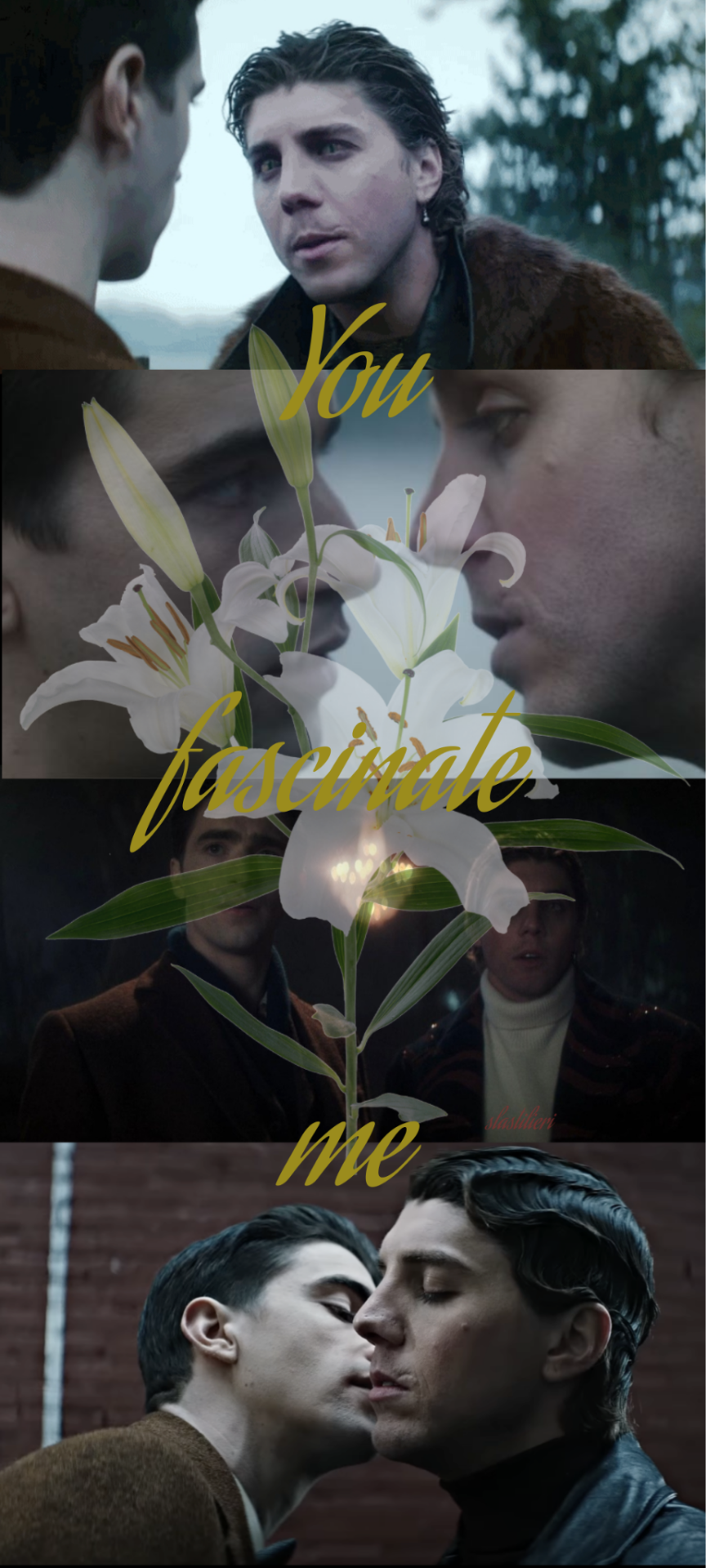
64 notes
·
View notes
Audio
Reiji’s moaning when making love. Edited from other R18 games.
WARING: NSWF/ R18/ HIGH EXPLICIT CONTENT. PLEASE USE A HEADPHONE. THIS AUDIO IS TOTALLY FANMADE.


4K notes
·
View notes
Photo
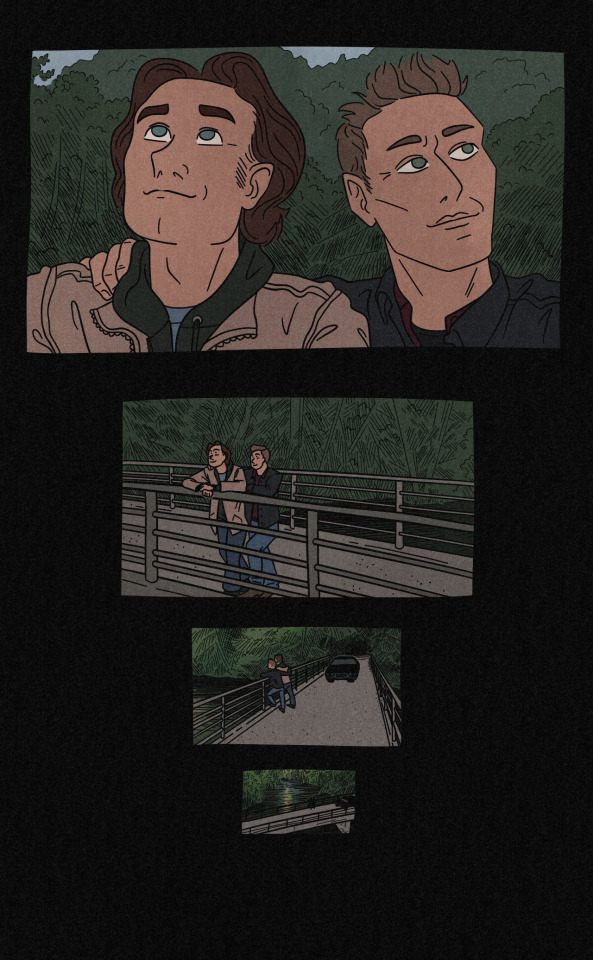
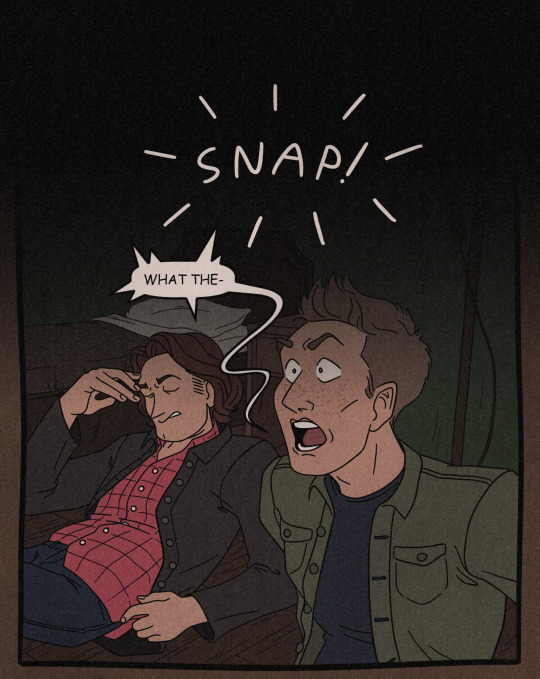
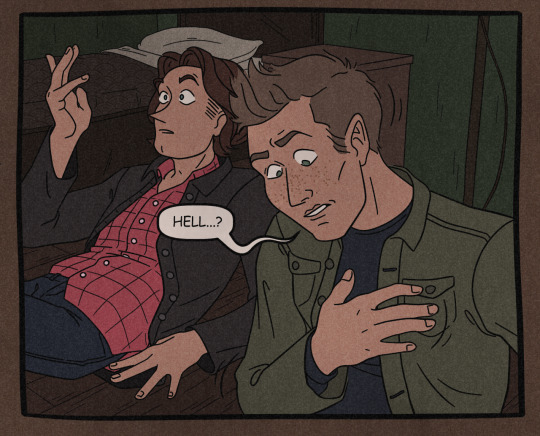
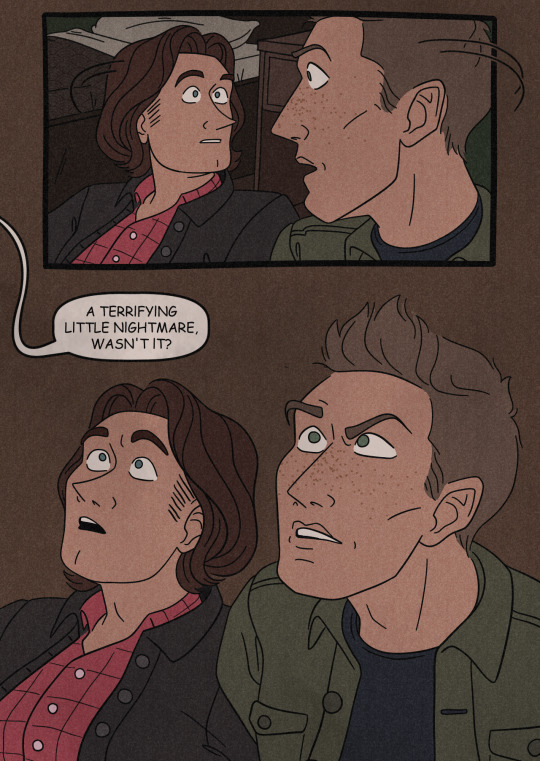
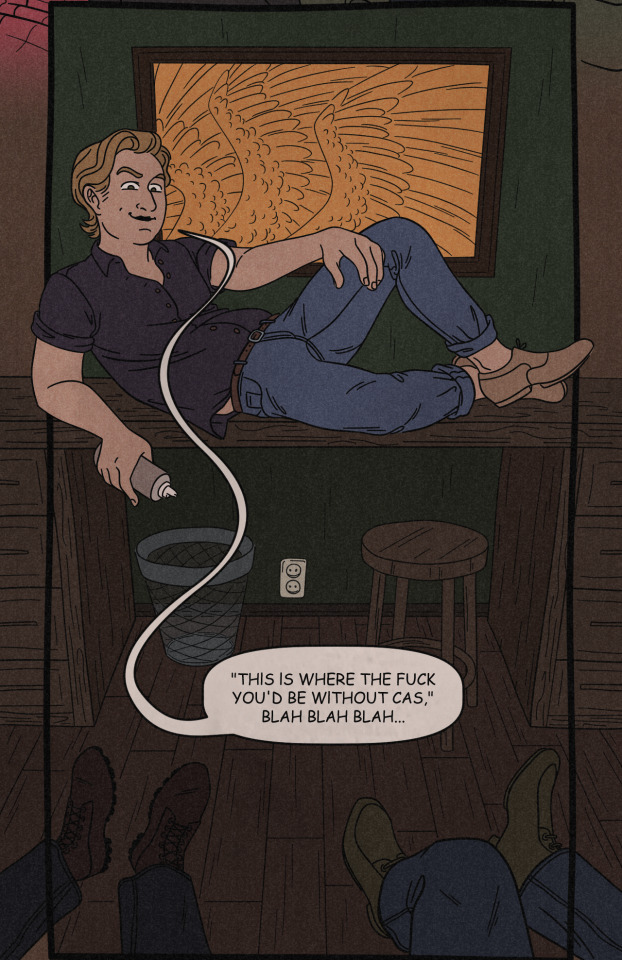
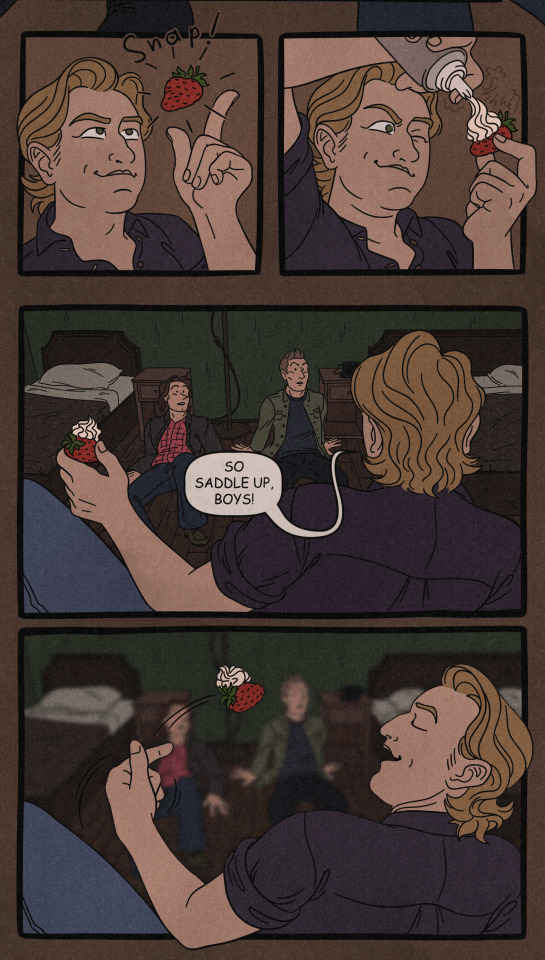
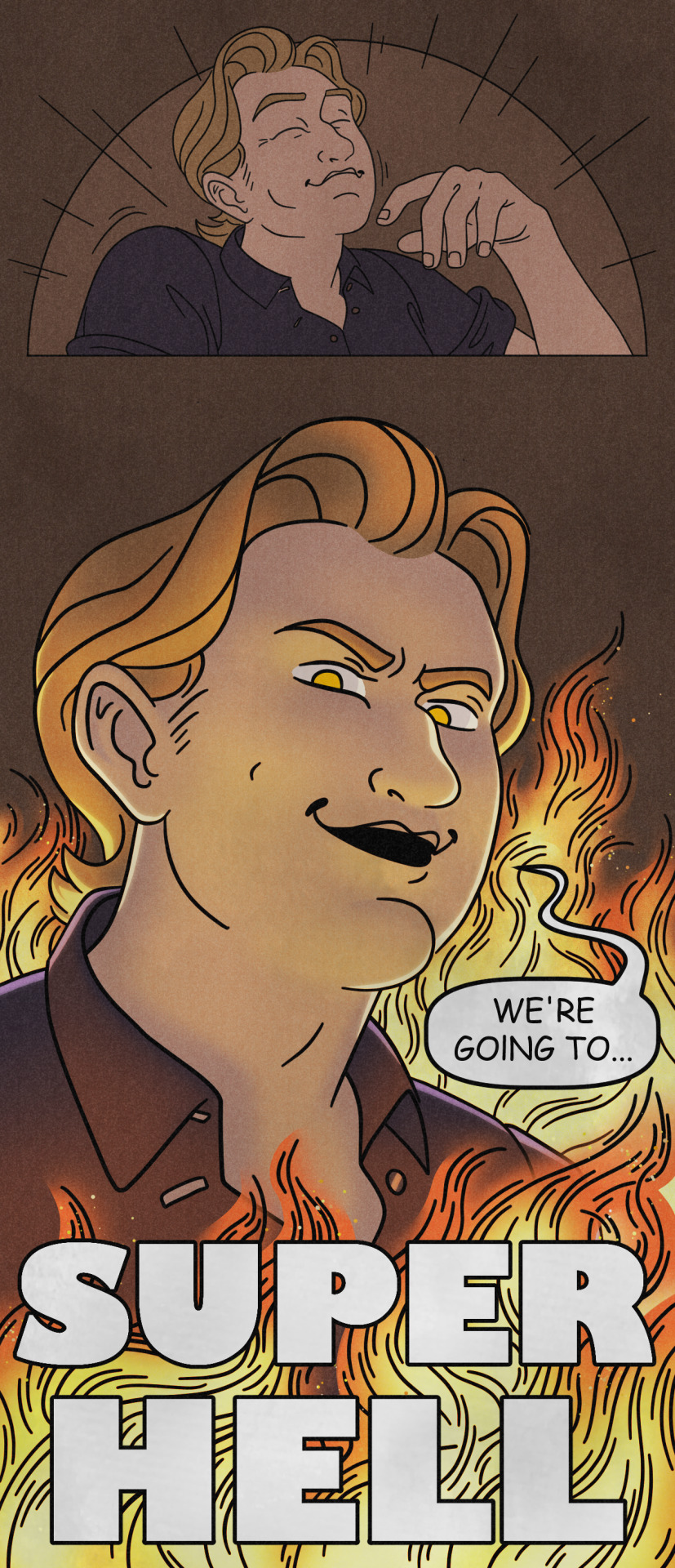
[Image description: a fifteen-panel digital Supernatural fan-comic, which begins with the last ever shot of the show, of Sam and Dean Winchester gazing wistfully over a river while leaning on the railing of a bridge with the Impala in the background, as the camera floats up and away from them. The four panels depicting this recede into darkness, which continues for a bit, until it is interrupted by the sound effect of a snap and dissolves to show the brothers waking up on the floor of a motel room, Sam with a headache and Dean with a startled “What the-”. The full, panel-by-panel description is under the read-more.]
Happy anniversary! here’s how gabriel can still win
Читать дальше
4K notes
·
View notes


